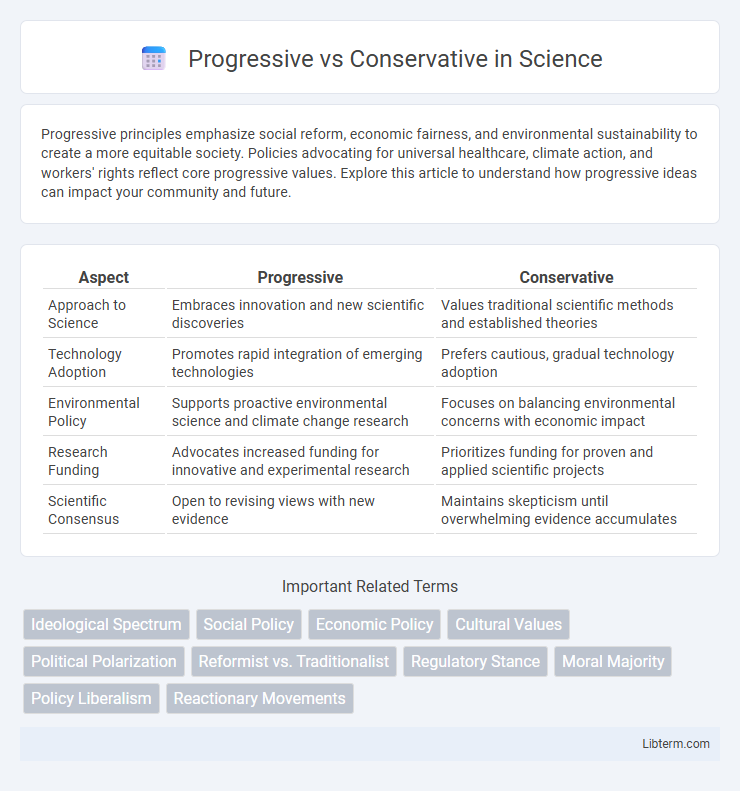Progressive principles emphasize social reform, economic fairness, and environmental sustainability to create a more equitable society. Policies advocating for universal healthcare, climate action, and workers' rights reflect core progressive values. Explore this article to understand how progressive ideas can impact your community and future.
Table of Comparison
| Aspect | Progressive | Conservative |
|---|---|---|
| Approach to Science | Embraces innovation and new scientific discoveries | Values traditional scientific methods and established theories |
| Technology Adoption | Promotes rapid integration of emerging technologies | Prefers cautious, gradual technology adoption |
| Environmental Policy | Supports proactive environmental science and climate change research | Focuses on balancing environmental concerns with economic impact |
| Research Funding | Advocates increased funding for innovative and experimental research | Prioritizes funding for proven and applied scientific projects |
| Scientific Consensus | Open to revising views with new evidence | Maintains skepticism until overwhelming evidence accumulates |
Understanding Progressive vs Conservative Ideologies
Progressive ideologies emphasize social reform, equality, and government intervention to address societal issues, advocating for policies like expanded healthcare, climate change action, and social justice. Conservative ideologies prioritize tradition, limited government, personal responsibility, and free-market principles, often resisting rapid social change and emphasizing individual liberties. Understanding the fundamental values behind each ideology helps clarify current political debates and policy preferences.
Historical Roots of Progressivism and Conservatism
Progressivism traces its roots to early 20th-century reform movements aimed at addressing industrialization's social inequalities and promoting government intervention for social justice. Conservatism originates from a desire to preserve traditional institutions, values, and social order, reacting against rapid changes and revolutionary ideas, notably solidifying during the 18th-century Enlightenment and post-French Revolution era. These historical foundations reveal Progressivism's emphasis on change and reform, contrasting with Conservatism's focus on stability and continuity.
Core Values and Beliefs: Progressives vs Conservatives
Progressives prioritize social justice, equality, and government intervention to address economic and social issues, advocating for policies like universal healthcare and climate action. Conservatives emphasize tradition, individual responsibility, limited government, and free-market principles, supporting strong national defense and preserving cultural values. These core beliefs shape their contrasting approaches to policy-making, societal norms, and economic management.
Economic Policies: A Comparative Analysis
Progressive economic policies prioritize wealth redistribution, higher taxes on the wealthy, and increased government spending on social programs to reduce income inequality and stimulate economic growth. Conservative economic approaches emphasize limited government intervention, lower taxes, and deregulation to encourage private sector investment, entrepreneurship, and free-market efficiency. Analyzing these frameworks reveals fundamental differences in addressing fiscal responsibility, social welfare, and economic growth strategies.
Social Issues: Divergent Perspectives
Progressive perspectives on social issues emphasize equal rights, social justice, and inclusive policies, advocating for reforms that address systemic inequalities affecting marginalized groups. Conservative views prioritize tradition, social stability, and individual responsibility, often resisting rapid changes to established social norms and institutions. These divergent perspectives shape debates on topics such as LGBTQ+ rights, immigration, and criminal justice reform.
Role of Government: Contrasting Views
Progressives advocate for a robust government role in regulating the economy, expanding social welfare programs, and addressing systemic inequalities through public policies. Conservatives emphasize limited government intervention, prioritizing free-market solutions, individual responsibility, and preserving traditional institutions. The contrast centers on whether government acts as a catalyst for social change or as a protector of personal freedoms and established norms.
Education and Cultural Attitudes
Progressive education advocates prioritize inclusive curricula, critical thinking, and social justice themes, fostering diversity and equality in learning environments. Conservative education supporters emphasize traditional values, discipline, and standardized testing, promoting a curriculum rooted in historical knowledge and moral absolutes. Cultural attitudes among progressives lean towards embracing multiculturalism and change, while conservatives often uphold established norms and cultural heritage.
Environmental Policies: Progressive vs Conservative Approaches
Progressive environmental policies emphasize aggressive climate action, renewable energy investment, and strict regulations on pollution to achieve sustainability and combat global warming. Conservative approaches often prioritize market-based solutions, energy independence, and gradual policy shifts to balance economic growth with environmental stewardship. This fundamental difference shapes legislative priorities and funding decisions in environmental regulation and innovation.
Impact on Modern Politics and Society
Progressive ideologies emphasize social equity, environmental sustainability, and government intervention in addressing economic disparities, shaping policies such as universal healthcare and climate action. Conservative principles prioritize tradition, limited government, and free-market economics, influencing legislation that upholds individual liberties and economic deregulation. The dynamic tension between these philosophies drives political discourse, affecting electoral strategies, judicial appointments, and cultural debates in modern democracies.
Future Trends and the Evolving Debate
Future trends indicate a shift toward progressive policies driven by technological innovation, climate change urgency, and evolving social values. Conservative frameworks emphasize preserving traditional institutions and cautious adaptation to economic and cultural shifts. The ongoing debate centers on balancing rapid reform with stability, highlighting diverging visions for governance and societal priorities.
Progressive Infographic

 libterm.com
libterm.com